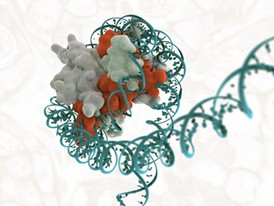As the genomics information age continues to unfold, high throughput genomic sequencing technologies are becoming increasingly efficient in creating large and complex data sets. Efficient ways to catalogue this data is key to comprehend the dynamic interactions that regulate gene expression and activity through epigenetic processes in normal biology and disease.
Epigenomics is a genome wide approach that identifies specific DNA sequences where these processes are targeted. Functional methylomes have been mapped using next generation capture sequencing technologies to distinguish variability in methylation patterns between cell types and disease.
Methylation is an epigenetic modification that involves the addition of methyl groups to cytosine residues, resulting in down regulation of gene expression. The addition of a methyl group displaces transcription factors that normally bind to the DNA and attracts methyl-binding proteins associated with gene silencing. CpG dense regions (containing high frequency of repeated cytosine adjacent to guanine via phosphodiester bond) are hot spots for methylation and governs cellular differentiation and functioning. These modifications can be stably inherited and undergo continuous changes throughout the cellular lifetime, influenced by environment and other factors. It is a key process involved in chromatin structure and stability, X-chromosome inactivation, genomic imprinting, and cell differentiation. Variations in methylation are known to be a contributing factor to multifactorial disease susceptibility.
Current methods used to map methylomes that utilize whole-genome interrogation are costly and inefficient due to the invariable states of most sites across individuals. More sensitive assays are required to capture the variable and individualized methylated sites for an informative analysis of disease variants. These sites extend beyond just the CpG-dense regions near promoters which current arrays tend to be bias toward (eg. Illumina450K array or reduced representation bisulfate sequencing).
MethylC-Capture Sequencing (MCC-Seq) is an alternative epigenomics approach that enables more efficient cataloguing of functional and disease-relevant epigenetic and genetic variants for large-scale disease association studies; and is customizable for disease or tissue-targeted functional methylomes.
In an upcoming webinar, Dr. Elin Grundberg will explain how an adipose-specific panel using MCC-Seq has been designed utilizing whole-genome bisulfate sequencing on adipose tissue samples and public databases. This technique focuses on high-density interrogation of methylome variability. Novel methylation variations have been highlighted within enhancers strongly correlated to plasma triglyceride and HDL cholesterol, including the fatty acid translocase CD36 (integral membrane protein). The comprehensive adipose-panel allows parallel assessment of tissue methylation and genotypes.
Dr. Elin Grundberg has been an Assistant Professor at McGill University since 2012, where her group in the Department of Human Genetics is applying various next-generation sequencing approaches to understand genetic and epigenetic factors underlying complex disease susceptibility. She is the author of almost 50 scientific papers, and currently holds a Canada Research Chair (tier 2) in Disease Genomics and Epigenomics.
For a more in-depth discussion with Dr. Elin Grundberg about this alternative epigenomics approach, register now at the following link: “Characterization of Functional Methylomes by Next-Generation Capture Sequencing Identifies Novel Disease Associated Variants“.







Join or login to leave a comment
JOIN LOGIN